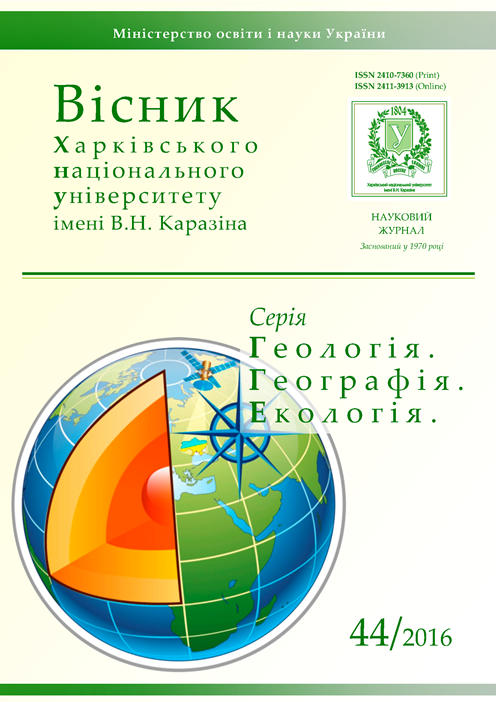Проблеми та перспективи розвитку пасажирського транспорту міста Харкова: суспільно-географічний аспект
DOI:
https://doi.org/10.26565/2410-7360-2016-44-19Ключові слова:
міський електричний транспорт, метрополітен, автомобільний транспорт, трамвайний транспорт, метротрам, монорейковий транспортАнотація
В статті здійснене ранжування всіх видів міського пасажирського транспорту представлених в місті Харкові на основі найвагомішого показника – кількості перевезених пасажирів за рік. Приведений аналіз переваг та недоліків кожного виду міського пасажирського транспорту та здійснене їх порівняння. На основі даного аналізу запропоновано оптимальні шляхи подолання труднощів у функціонуванні транспортної системи та надані певні рекомендації. Виділено альтернативні види міського транспорту та обґрунтовано їх переваги. Розкрито перспективи створення та налагодження роботи метротраму і монорейкового транспорту. Зокрема, зазначено рентабельність спорудження необхідної інфраструктури та закупівлі рухомого складу за рахунок порівняння аналогічних робіт в інших країнах. Розглянуті можливості комбінування і взаємодії з вже існуючим видами транспорту. Запропоновано оптимальні маршрути функціонування нових для міста Харкова видів транспорту.
Посилання
1. Bezlyubchenko, O. S., Hordiyenko S. M., Zaval’nyi (2006). Planuvannya mist i transport [Cities planning and transport]. Kharkiv, Ukraine: HNUMG, 138.
2. Hrabel'nykov, V.A. (2012). Systema miskoho pasazhyrskoho transportu yak obyekt upravlinnya [City public transport system as subject to management]. Scholarly works: research and methodology journal, Government Control, 194 (182), 118-122.
3. Hunko, I. V., Hutsalenko O. V. (2015). Transport - aktualni problemy ta s'ohodennya [Transport – current issues and reality]. Technics, energy, agroindustrial complex, 2, 98-104.
4. Kaylyuk, Ye. M, Kryshtopets', I. M. Problemy ta perspektyvy rozvytku mis'koho pasazhyrs'koho transportu na prykladi m. Kharkova [Issues and perspectives of the city passenger transport in Kharkiv]. Available at: http://eprints.kname.edu.ua/32553/1/88.pdf
5. Lezhneva, O. I. (2013). Rezultaty doslidzhennya zabrudnennya atmosfernoho povitrya avtomobil'nym transportom na vulytsyakh m. Kharkova [Results of atmospheric air pollution caused by automobile transport in Kharkiv city]. Motor transport, 33, 110-114.
6. Moroz, M. M. (2015). Shlyakhy vdoskonalennya pasazhyrs'kykh perevezen' transportom zahal'noho korystuvannya [Ways to improve passenger transportation by common transport]. Collection of research papers of Kirovograd national technical university. Technics in agricultural production, industrial engineering, and automatization, 28, 57-63.
7. Moroz, O. V. (2011). Modelyuvannya vyznachennya obsyahu popytu mis'kym pasazhyrs'kym transportom [Modelling the demand volume measurements on city public transport]. Project managing, system analysis and logistics, technical issue, 8, 340-343.
8. Novikova, A. M. (2010). Hromads'kyy transport Avstriyi: dosvid ta uroky dlya Ukrayiny [Austria public transport: experience and tutorials for Ukraine].Ukrainian motor road book, 6, 4-9.
9. Novomyrs'ka, I. B. (2011). Osnovni metody ta modeli prohnozuvannya obsyahiv pasazhyrs'kykh perevezen' transportom zahal'noho korystuvannya [Principal methods and models to predict public common transportation scope]. National Transport University newsletter, 24 (2), 198-202.
10. Ozerova, O. O. (2013). Prohnozuvannya pasazhyrs'kykh potokiv u velykykh transportnykh vuzlakh [Predicting passenger flow in big transport hubs]. Transport science and progress. Newsletter of Dnipropetrovsk National University of Railway Transport named after Academician V. Lazaryan, 6, 72-80.
11. Otechko, S. A. (2011). Vehicle transport effect on Kharkiv ecology. Proceding of 4th Ukrainian scientific conference with international scientists. Sumy (Ukraine). P. 385-388.
12. Kharkiv general plan. Available at : http://uga.kharkov.ua/v-transport/
13. Electronic encyclopedia. Available at : http://uk.wikipedia.org/
14. Kharkiv of transport. Available at : http://gortransport.kharkov.ua/
15. Pankratov, D. P., Faletska, H. I. (2015). Vybir pasazhyramy shlyakhu peresuvannya u mistakh [How passengers choose transportation ways in cities]. O.M.Beketov National University of Urban Economy. Kharkiv, 164.
16. Transport complex of Kharkiv region in 2012 (2013). Collected statistics. Main statistics office in Kharkiv region. Kharkiv, 96.
17. Fedorov, V. A. (2014). Horodskoy passazhyrskyy transport Sankt-Peterburha: polytyka, stratehyya, ekonomyka (1991-2014 hh.) [City passenger transport of Saint Petersburg city: politics, strategy, economics (1991-2014)]. Saint Petersburg: Print, 232.
18. Chuvayev, P. I. (2013). Problemy ta perspektyvy rozvytku avtomobil'noho transportu Ukrayiny [Problems and development prospectives of motor transport in Ukraine]. SevNTU newsletter. Machines and instruments construction and transport, 143, 196-198.
19. Shinkarenko, D. A. (2013). Transport yak skladova transportno-komunikatsiynoyi systemy velykoho mista [Transport as a part of transport and communication system of a city]. Newsletter of V. N. Karazin Kharkiv National University. Geology – Geography – Ecology, 1049 (38), 177-182.
20. Maslak, О. І., Moroz, О. V., Moroz, М. М. (2014). Specific features of city public transport financing (Kremenchuk case study). Economics contemporary issues, 10, 239-246.
21. Sotnichenko, L. (2013). Intelligent transport systems - quality factor of the development of the transport system. Economics innovations, 56, 136-143.
##submission.downloads##
Опубліковано
Номер
Розділ
Ліцензія
Авторське право (c) 2016 C. A. Отечко

Ця робота ліцензується відповідно до Creative Commons Attribution 4.0 International License.
Автори, які публікуються у цьому журналі, погоджуються з наступними умовами:- Автори залишають за собою право на авторство своєї роботи та передають журналу право першої публікації цієї роботи на умовах ліцензії Creative Commons Attribution License, котра дозволяє іншим особам вільно розповсюджувати опубліковану роботу з обов'язковим посиланням на авторів оригінальної роботи та першу публікацію роботи у цьому журналі.
- Автори мають право укладати самостійні додаткові угоди щодо неексклюзивного розповсюдження роботи у тому вигляді, в якому вона була опублікована цим журналом (наприклад, розміщувати роботу в електронному сховищі установи або публікувати у складі монографії), за умови збереження посилання на першу публікацію роботи у цьому журналі.
- Політика журналу дозволяє і заохочує розміщення авторами в мережі Інтернет (наприклад, у сховищах установ або на особистих веб-сайтах) рукопису роботи, як до подання цього рукопису до редакції, так і під час його редакційного опрацювання, оскільки це сприяє виникненню продуктивної наукової дискусії та позитивно позначається на оперативності та динаміці цитування опублікованої роботи (див. The Effect of Open Access).





